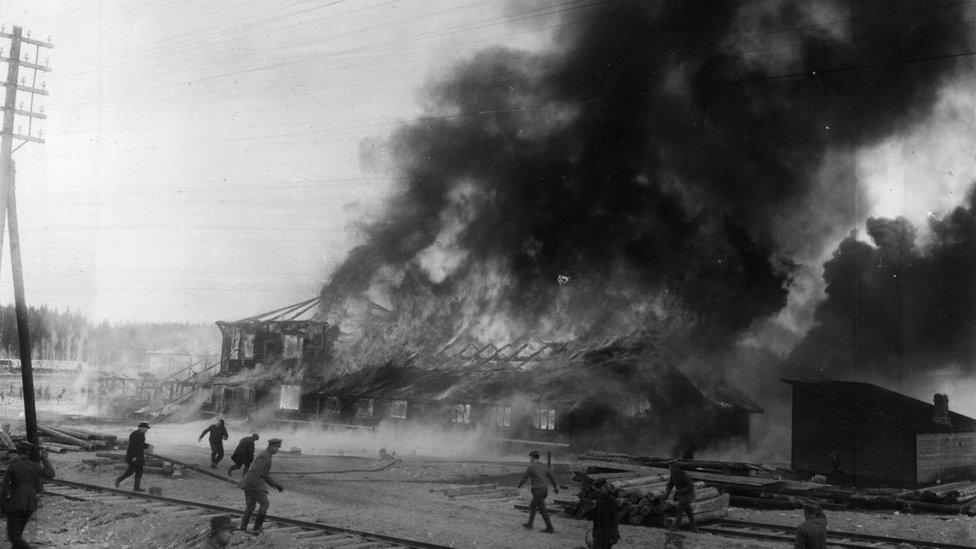Finland plans to rebury civil war dead in churchyard
- Published

Tens of thousands died during the three-month civil war and its aftermath
Local authorities in a Finnish city are hoping to open a mass grave from the country's 20th Century civil war and rebury the dead in a churchyard.
The grave site at Heinola - 140 km (87 miles) north of the capital Helsinki - is currently in the middle of an industrial park with a stone marker showing its general location, reports.
While the White Guards involved in the battle for Heinola buried their dead in cemeteries, fleeing communist Reds who died in large numbers during their breakout from the VierumÃĪki district of the city in the spring of 1918 weren't afforded the same dignity, and were buried in a mass grave.
Now, plans proposed by the city government and one of the companies in the industrial park hope to identify the 300 communist fighters in the grave and bury them in individual coffins in one of three local cemeteries.
However, that task may be difficult, and certainly won't be cheap, with samples of each body being sent for DNA testing.
"It may be very difficult to identify who is in the grave," war historian Jukka Kulomaa explaining that the fighters "came from a wide swath of southern Finland, from many different localities."
But despite the cost, possibly running into hundreds of thousands of Euros, Olli Soininen of the National Board of Antiquities says that "We must treat these poor people with respect".
Many Finns sided with the White Guards' cause in the country's 1918 civil war
War still divides Finland 100 years on
Finland is this year marking the centenary of the war between the victorious German-backed Whites and the Soviet Russia-backed Reds, which resulted in the deaths of approximately 39,000 people.
For decades after the conflict, Finnish society was split between White or Red camps. "Youth associations, sports clubs and even retail shops catered to either one or the other. People had to be careful which concerts and events they participated in, as it communicated a message about their political sympathies," Yle said .
A survey carried out by Yle 100 years after the hostilities finds that the war still divides Finnish opinion.
"The strongest and most permanent division of the Finnish Civil War is that the left still sympathises with the Reds and the right with the Whites," historian Seppo HentilÃĪ says.
While a majority of Finns polled say they think the White cause was justified, two-thirds say that they should have been held accountable for their post-war behaviour, in which some 20,000 Reds were either executed or starved to death.
"It is staggering to think that two-thirds of Red deaths occurred after the war was finished," HentilÃĪ told Yle.
Reporting by Alistair Coleman
Next story: NZ Maori win first football internationals against Australian Aboriginal team
Use #NewsfromElsewhere to stay up-to-date with our reports via .